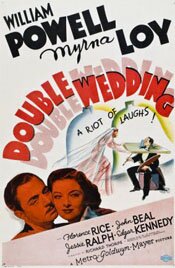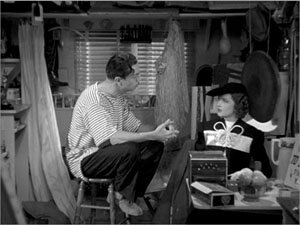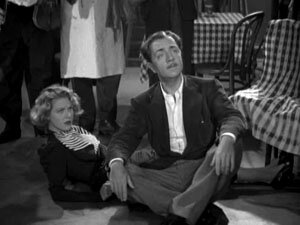 Directed by Richard Thorpe
Directed by Richard Thorpe
I laughed and I smiled. That’s about all a comedy laced with a romantic storyline can and should aspire to and Double Wedding achieves this and under conditions you would expect to douse the lightness.
Starring William Powell and Myrna Loy in one of their many pairings, while it was being shot Powell’s fiance at the time, Jean Harlow, died and production was shut down for a few weeks, according to Stuart Henderson. Powell returned to complete the movie and that, combined with the kind of performance he gives in the movie, tells us a good deal about the kind of man and performer William Powell was.

Powell is Charlie Lodge, a bohemian artist and aspiring movie director-producer who is preparing two young people for a film he wants to make (in a casual way). They are Irene Agnew (Florence Rice) and Waldo Beaver (John Beal).
The couple is engaged less because they are in love (which they are) and more (in fact, mainly) because Irene’s sister, Margit (Myrna Loy) has decided they will be and has planned it.
In fact, Margit decides everything for them from food to clothes to … well, everything. And neither Irene nor Waldo has the backbone to stand up to her. Waldo is particularly submissive: so much so, Irene feels compelled to reject him because he hasn’t the will to fight for her.
He lacks “yumph,” as the movie would have it.
Then there is Margit. She is the complete opposite of Charlie and so, as happens in the movies, they are destined to be together. But they must first sail through some rough waters! And that is where the humour lies.

Both Powell and Loy play characters that are considerably different from what we generally associate with them.
Loy is cool and distant and, with her porcelain features, delivers a very convincing performance as a woman determined to control everything and everyone.
However, what really struck me was Powell as Charlie. While still retaining that sense of “class” we normally associate with him, he is both convincing and seemingly inspired as a free-spirited character. I say seemingly because of the circumstances surrounding the film — Harlow’s illness and death.
It is initially a bit bizarre seeing Powell dressed and acting in this goofy and free manner but he soon pulls you in and makes you believe. There is also, to a degree, something of My Man Godfrey in his role here in that he must show a comparatively well-to-do family how to live because they are so far off the mark. (Godfrey would be released the next year, in 1938.)
This is a screwball comedy, and successful one, though it’s ending is a bit surprising as it devolves into slapstick — funny, but a bit puzzling and with a feeling of incongruity taken with most of the film. I can’t help wondering if this was one of the final scenes shot, after Powell had returned following the tragic news of Harlow, because the end minimizes his part — at least the speaking element — and focuses on Loy’s character to carry the scenes.
Regardless, I enjoyed Double Wedding. It’s a fun and funny screwball comedy and well worth seeing.
Other Loy and Powell movies:
- Evelyn Prentice (1934) (Loy & Powell Collection)
- I Love You Again (1940) (Loy & Powell Collection)
- Love Crazy (1941) (Loy & Powell Collection)
- The Thin Man (1934) (Complete Thin Man Collection)




1 Response